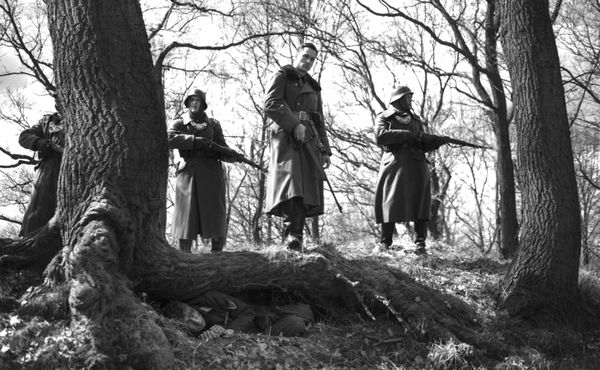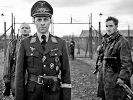Eye For Film >> Movies >> The Captain (2017) Film Review
The Captain
Reviewed by: Anne-Katrin Titze

In 1956, Helmut Käutner's movie adaptation of Carl Zuckmayer's play Der Hauptmann von Köpenick, which revolves around a dislocated captain's uniform that drastically changes people's reactions towards its new owner, it was the actor Heinz Rühmann, the eternally boyish German movie star, who played the title role. Harmless and forever a droll man-child, Rühmann turned the impersonation into an exercise of playfully debunking rusty hierarchies.
What happens in The Captain (Der Hauptmann) is a kind of debunking of the debunking. There is nothing charming left in this all-is-lost and boys-will-be-boys scenario when violence perpetuates itself and decency is nowhere to be found.

Director/screenwriter Robert Schwentke tells the real-life tale of Willi Herold, the "Executioner of Emsland", in stunning black and white images (shot by his longtime collaborator Florian Ballhaus) - something to be grateful for, because too much fake realism could be either too disturbingly gruesome, or too artificial to make us care. He walks a fine line here and the black and white makes good sense emotionally.
It is April 1945 and the war will be over in two short weeks. German Corporal Willi Herold (Max Hubacher), a deserter, only just escaped capture from the army by hiding in a hollow space beneath a tree. The image of him tucked in the roots suggests that he is crawling out of the German soil, the underbelly of the forest, a mythological creature; he also has a bit of Nosferatu in his face.
Soon the desperate corporal comes across an abandoned vehicle on a country road. It contains a basket of apples and a captain's uniform which, not counting the length of the pants, miraculously fits the wretched young soldier.
Far from being merely a farce about hierarchy and stolen clothes that make the man, the film merges a variety of tones into a Nazi tableau, unique in German film history. In order to pull off the stunt, the impostor Herold has to convince the band of men that suddenly flock around him, that his orders, including special cruelty, have come from the very top, from Hitler himself.
We are shackled, like it or not, to the perceptions of the protagonist, (just as we were attached at the opposite end of the spectrum, to Géza Röhrig's Saul in László Nemes's Oscar-winning Son Of Saul.) Herold is, to say the least, not a nice man. His own hardships did not make him kinder to others (see the miniature version in Dawn Wiener in Todd Solondz' Welcome To The Dollhouse, Palindromes, Wiener-Dog).
The distancing effects come across as not too much and not too little. Hubacher, the actor, never makes us forget that he is a man of the 21st century, plopped into mid-20th century history, which gives the character both a knowing-in-retrospect and a slightly callow air.
The ensemble cast surrounding Herold is strong. We don't know how much these military men know because motivations stay opaque, while their actions speak as loud as thunder. Especially Alexander Fehling as Captain Junker (star of Giulio Ricciarelli's Labyrinth Of Lies) mesmerisingly walks a tightrope between opportunism, sadism, and charm. Is this a film about Germany at a particular point in time? You bet. Try to reduce The Captain to that, though, and you shortchange yourself.
"Das gibt's nur einmal, das kommt nie wieder" hovers in the air throughout, ever since it is first sung by Herold upon the discovery of the uniform. Originally performed on screen by Lilian Harvey in Erik Charell's 1931 costume musical Der Kongreß tanzt (about the behind-the scenes amusements during the Vienna Congress, which reorganized the German principalities in 1815) the song lyrics ("This can only happen once, this will never come again" and later contradicting itself "Every spring has only one May") make this an inspired choice.
Various pasts are evoked at once during this one song: 1815, 1931, 1945 and 2018 (because Hubacher sings it unmistakably as a Millennial) inform each other about uniqueness and repetition, nationalism in its manifold forms, singularity and the variations on an eternal return.
The Captain concludes in a similar time-crossing vein, with scenes in the present that show the actors in their uniform costumes invading a small German town, taking selfies with passers-by, checking handbags, mildly harassing the mildly puzzled population. What could have easily felt like a mere gimmick, has an unsettling poignancy instead. You shudder at these closing moments of the filmmaker's expedition into the Nazi heart of darkness precisely because what seemed like a given only a few short years ago, that is - a firmly grounded "never again" consciousness - is not so certain any more.
It is precisely because things can be said in public today that were considered loopy fringe proclamations only recently, that Schwentke's film with its depiction of violence is such a timely reminder. The cruelty is not frivolous but necessary as it addresses the question of power dynamics, the lure of getting away with things, and the notion that the best disguise lies in the greatest lie.
The Captain is an unsparing and uncompromising look at what happens when men are worn down by war and by having lived for far too long within a system using cruelty and lies as its bread and butter.
Reviewed on: 28 Aug 2018















